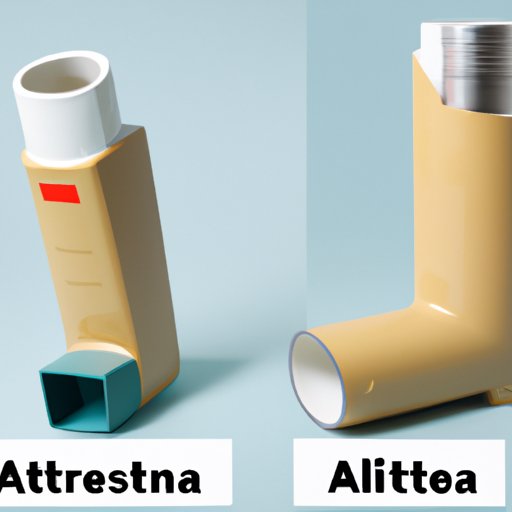
Introduction
If you suffer from asthma or other respiratory conditions, inhalers are likely an essential part of your daily routine. Inhalers allow you to take medications that can relieve symptoms, improve breathing, and prevent respiratory distress. However, while inhalers can be a lifesaver, using them improperly or too often can have serious consequences. In this article, we’ll discuss the importance of using your inhaler correctly, understanding dosing guidelines, maximizing effectiveness, avoiding overuse, common mistakes, safety guidelines, and when to seek medical advice.
The Importance of Using Your Inhaler Correctly
One of the most important aspects of inhaler usage is proper technique. Correct usage can reduce the risk of side effects and ensure that the medication is effectively targeting the lungs. On the other hand, improper technique can lead to medication buildup in the mouth and throat or delivery of inadequate dosages.
Another crucial aspect of proper inhaler usage is timing. Some medications are intended to be taken at specific times of the day, while others are designed to be taken only when symptoms appear. Failure to follow timing guidelines can lead to inadequate symptom relief or increased risk of side effects.
Finally, the proper cleaning and maintenance of your inhaler can significantly extend its lifespan and prevent the buildup of bacteria that can cause infections. Inadequately cleaning your inhaler can cause mold or bacteria buildup, leading to respiratory problems.
How Many Puffs a Day? Understanding Inhaler Dosing Guidelines
Inhaler dosing guidelines vary based on the type of medication and the severity of the respiratory condition. Typically, doses are based on weight and age, with higher doses for adults and those with severe conditions. A healthcare provider can determine the best dosage based on an individual’s current respiratory health, as well as consider any other medications currently in use.
It’s important to follow the instructions given by your healthcare provider and not exceed the recommended dosage. Taking too much medication can lead to adverse side effects and increased risks of respiratory distress.
Maximizing Your Inhaler’s Effectiveness: Tips for Proper Usage
There are several best practices you can follow to maximize the effectiveness of your inhaler:
- Begin by shaking the inhaler before each use to ensure that the medication is evenly distributed.
- Proper inhalation requires deeply inhaling the medication as soon as it is released. This allows the medication to reach the lungs quickly and effectively.
- Hold the medication in your lungs for at least five seconds before exhaling.
- Wait at least 30 seconds before taking an additional puff if more than one puff is prescribed at a time.
- Clean your inhaler regularly to remove any buildup and prevent the spread of bacteria.
Avoiding Inhaler Overuse: How Often is too Often?
Inhaler overuse occurs when an individual takes more puffs per day than recommended by their healthcare provider or when they use medication that is not adequately controlling their symptoms. This can lead to increased tolerance, decreased effectiveness of the medication, and the risk of serious side effects such as high blood pressure, tremors, and heart palpitations.
The recommended maximum usage of an inhaler varies depending on the type of medication and the severity of the condition. In general, using a short-acting inhaler more than four times a week is a sign of inadequate symptom control and may require medical attention. Long-acting inhalers, on the other hand, are typically used twice a day. It’s important to track your inhaler usage, including the number of puffs taken per day, to ensure that you’re using your inhaler properly and not overusing it.
Inhaler Mistakes You May Be Making and How to Fix Them
Common inhaler mistakes include using the wrong technique, wrong dosage, or wrong timing. It’s important to consult with your healthcare provider to ensure you’re using your inhaler correctly. Additionally, common mistakes such as not shaking the inhaler before use, exhaling too quickly after inhaling medication, and not waiting long enough between puffs can decrease the effectiveness of the medication.
One effective method to overcome these mistakes is to work with a healthcare professional, such as a respiratory therapist, to develop an inhaler technique that works best for you. This can include personalized instruction on inhaler use, dosage, and proper timing to maximize the effectiveness of the medication.
Using Your Inhaler Safely and Responsibly: A Guide
To use your inhaler safely and responsibly, it’s important to follow these guidelines:
- Keep your inhaler out of reach of children.
- Store your inhaler in a cool, dry place away from direct sunlight.
- Clean your inhaler regularly to prevent the buildup of bacteria.
- Never prolong the use of your inhaler beyond the expiration date.
- Dispose of inhalers properly and according to local regulations.
When to Seek Medical Advice for Inhaler Use: Signs of Trouble
Potential side effects of inhaler use include mild symptoms such as increased heart rate, dizziness, and tremors, and in rare cases, serious side effects such as difficulty breathing, chest pain, and allergic reactions. If any of these symptoms occur, it’s imperative to speak with your healthcare provider promptly. In some cases, emergency care may be necessary.
It’s also important to seek medical advice if your inhaler is not providing adequate symptom relief or if you notice a decrease in its effectiveness. These issues may be an indication that your medication or dosage needs to be reevaluated.
Conclusion
In summary, inhalers are a critical tool for those who suffer from respiratory conditions such as asthma. Using them properly, following recommended dosage schedules, and cleaning them regularly can maximize their effectiveness and ensure their safe use. By avoiding overuse, overcoming common mistakes, practicing proper safety guidelines, and seeking medical attention when necessary, you can use your inhaler successfully and enjoy a better quality of life.
Remember, proper usage of inhalers is crucial for your respiratory health, and working with your healthcare provider can help ensure proper inhaler usage. When used responsibly, inhalers can provide significant relief and improve your overall respiratory well-being.





